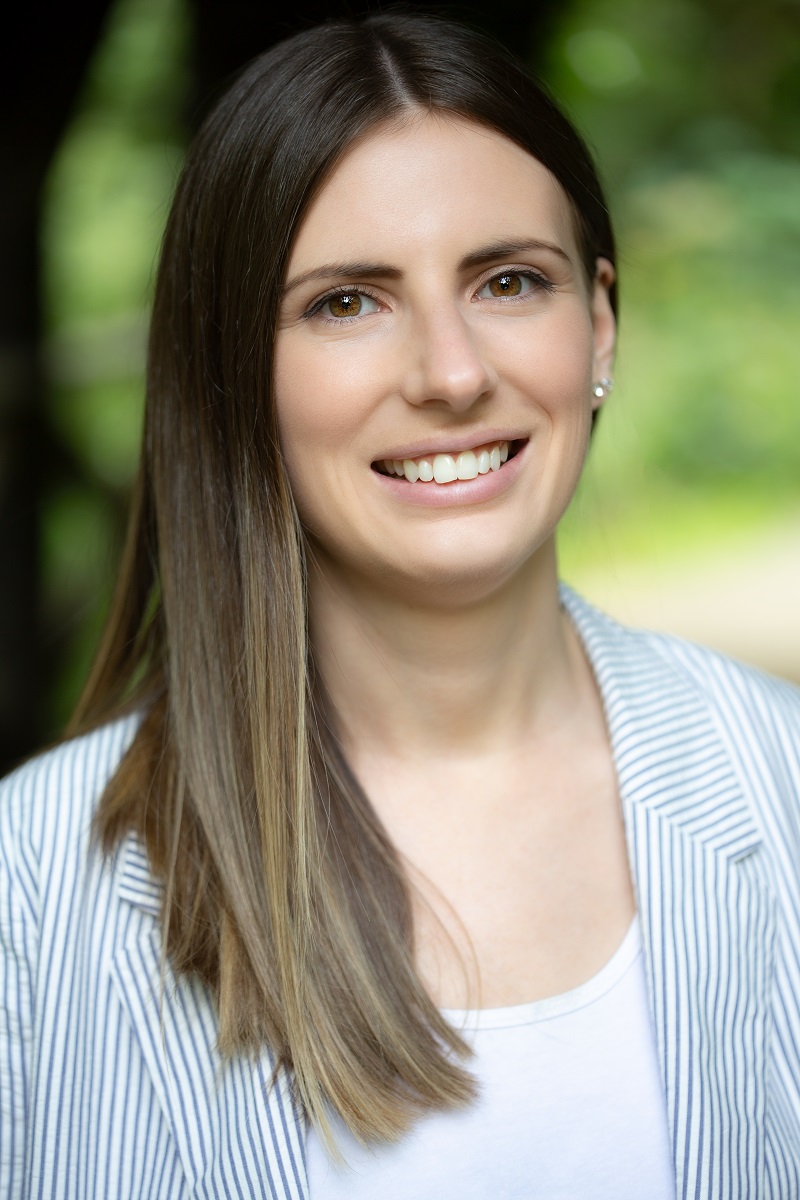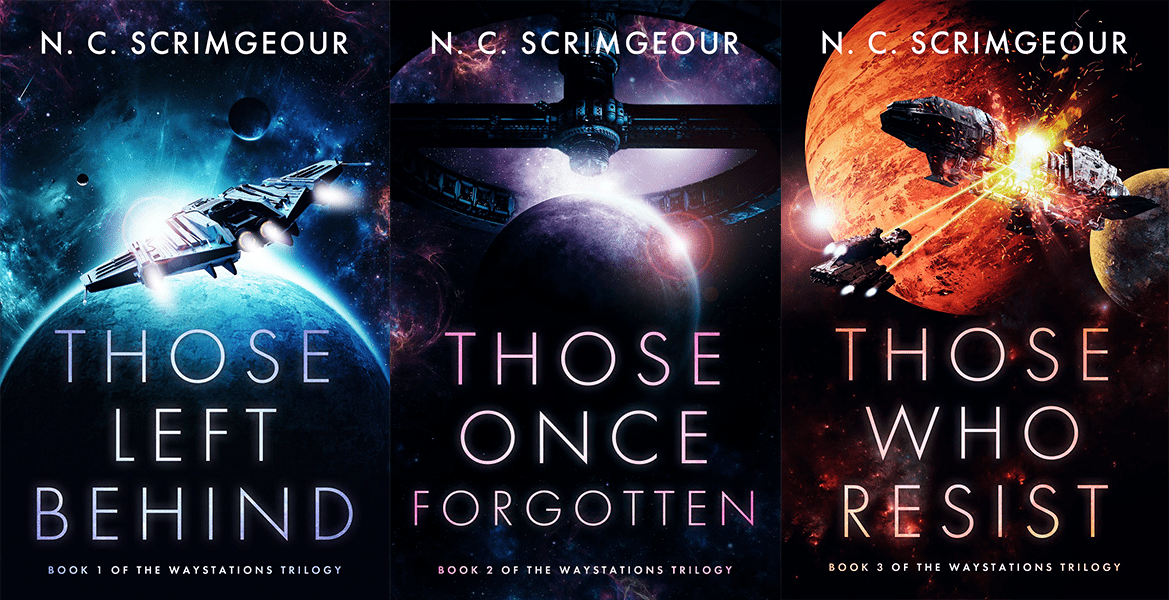March of the Sequels: N. C. Scrimgeour
2 Mar 2023The Author/s

N.C. Scrimgeour
N.C. Scrimgeour is a science fiction and fantasy author whose books focus on character-driven stories in vibrant worlds, from folklore fantasy to space opera.
After completing her Masters in English Literature, she went on to work in journalism and marketing and communications while pursuing her passion in writing.
When she’s not working on her books, she enjoys playing story-driven RPGs, watching and reading all things science fiction and fantasy, and getting outdoors with the dog for a good walk!
The Interview
First of all, tell me a little about your series and introduce us to the sequel(s).
The Waystations Trilogy is pretty much a love letter to all my favourite sci-fi. It’s a series full of big character moments, space exploration, lots of action and drama, and epic, galaxy-spanning stakes. And aliens – there has to be aliens!
The main story centers around the crew of a starship who leave behind their dying planet in search of a new home for humanity. But when their arrival in a new galaxy triggers some ancient alien technology, they find themselves in the middle of something much bigger than they bargained for. Each of the main characters has their own journey and challenges to contend with—from exploring ancient ruins to navigating a civil war—but they all have a part to play in standing against the threat that’s coming.
The trilogy functions as one overarching story over three books, so Those Once Forgotten picks up right where Those Left Behind finishes. (Yes, there was a cliffhanger. Multiple cliffhangers. I’m sorry!) Our characters find themselves reeling in the aftermath of a huge decision one of their own made at the end of the last book and are left to pick up the pieces while they continue finding their own way in the galaxy.
Sometimes middle books can feel like a bit of a slump, and that was something I actively wanted to avoid. There are big developments in this book—it’s not all kept for book 3! The characters have to dig deeper in their own personal battles. Some of their relationships grow stronger, while others fracture completely. I was definitely aiming for an ‘Empire Strikes Back’ kind of tone for the sequel—more conflict, higher (and more personal) stakes, and an exciting lead into the final installment.

Do you find that most of your readers continue to read the whole series? Why do you think that is?
So far, I’ve found around 33% of readers who bought Book 1 have gone on to buy Book 2, and then about 70% of those readers have continued to Book 3. In Kindle Unlimited, it’s a bit different: around 46% of readers have gone from Book 1 to Book 2 so far, and 48% from Book 2 to Book 3.
It’s difficult to read too much into the stats as I don’t have all of the information. But a lot of my Book 1 sales have come from 99c promotions, which can often lead to people buying your book but not necessarily getting around to reading it right away. So I hope when they do get around to it, they enjoy it enough to want to continue! Book 3 only came out in November last year, so I would expect the follow-through reads for that to pick up a bit over the coming months too.
How difficult is it to add new characters in a sequel into already established relationships?
I already juggle quite a lot of characters in Those Left Behind—there are five main point-of-view characters and a big cast of side characters. So when it came to the sequel, Those Once Forgotten, I didn’t want to introduce too many new characters. I focused more on delving deeper into my main characters and fleshing out my side characters, though there are a couple of new faces!
The most important thing to me was to only introduce new characters where it made sense and to make sure they played some sort of purpose in the overall story.
Is it difficult to continue with worldbuilding for a world you have already built in book 1? Do you find it easier to switch locations for the sequel and start again with worldbuilding?
Because the trilogy is basically one continuous story spread over three books, we actually return to a lot of the same locations and settings as we visited in the first book. As a writer, it’s nice to revisit these places and develop them more, but it’s even more exciting to introduce new worlds, so we also go to some exciting new locations in the sequel, including a barren moon, an abandoned ice outpost, a skyscraper-filled capital city, and a tropical uncharted planet. One of my favourite things about Star Wars (the movies, but especially the games) was getting to see and explore lots of different environments, and that’s definitely something that comes through in my writing.
There’s also the central mystery of the waystations and the beings who created them, and there’s a lot of new revelations about that in the sequel which I really enjoyed writing.
Those Left Behind has got recently to the semifinals of SPSFC2. How did you feel about it?
Honestly, I was completely blown away. I entered the first SPSFC with my debut novel The Exodus Betrayal (which actually functions as a kind of prequel/origin story to the Waystations Trilogy) but it didn’t really make any waves.
I knew Those Left Behind was a much stronger book, so I hoped it might have a chance of getting further, but I definitely never expected to make it to the semi-finals! Even getting to the quarter-finals was amazing, so to progress even further and get such positive comments from the judging team really meant a lot to me.
Also unrelated, but you are currently writing a fantasy novel. Could you tell us a little about your WIP?
I am really excited about this one—it’s kind of going back to my roots as I actually started off writing fantasy before switching to sci-fi. It’s a Scottish-inspired dark fantasy which centres around selkie folklore: think magical creatures, high seas adventure, dreary weather, and treacherous storms! Similar to Waystations, it’s got a good mixture of personal stakes and larger stakes—there will be lots of family conflict and torn loyalties in between ancient magic and bloody raids!
This isn’t a completely new project for me—the first version of this book actually got me an agent back in 2017. Sadly, traditional publishing never quite happened for me, and when I switched to self-publishing I decided to focus on my sci-fi books first.
Now that the Waystations Trilogy is complete, I’ve had an urge to go back to fantasy again, so I decided to rewrite the book I first started with. It’s a completely new story, but a lot of the core concepts, themes, and some character aspects are similar. I know I’ve improved a lot as a writer since I first wrote the original, so I wanted to revisit it and turn it into something even better.
Have you ever been stymied by a worldbuilding or plot detail from book 1 that is very inconvenient to deal with or write your way around in subsequent books?
I think it’s almost inevitable that you run into issues you wish you could have resolved differently due to choices you made in previous books. There’s never been anything so major that I’ve really struggled, more like smaller things I’d have done differently if I had the knowledge then I do now. And sometimes it also works the other way around—you leave breadcrumbs or foreshadowing in Book 1, but then realize it doesn’t make sense or serve the story to follow through on it in the sequels, so you have to tie it up early or resolve it in a different way.
Would you say your craft has improved with the subsequent books?
In general, I think so. But I’m also a bit of a perfectionist, so I also look back and see things I could have or should have done better, even in my most recent books. I do think my prose gets better with each book I write, but there are always things you look back at and think maybe you could have done differently.
I think (hope!) that my craft and prose is better than it ever has been, and I’m really proud of how my new fantasy book is coming together. I think it is my best work so far, so I’m looking forward to being able to release it later this year and seeing if others agree!
Do you have all the timeline planned for the full series?
I tend to always have a plan in mind about how a story/series will end before I begin writing. I like knowing where I’m going, because that informs how I’ll write getting there. I’m not rigidly stuck to an outline, because when I start writing I’ll get new ideas on how to develop characters and plotlines, but I like to have at least a rough idea of the main plot beats and story arcs as a structure to how I’m putting the story together.
In terms of the Waystations Trilogy, a key moment in the ‘final battle’ in Book 3 is actually foreshadowed back in Book 1, so there’s definitely something to be said for planning ahead!
Do you have any marketing tips for sequels?
It’s so tough, especially with something like the Waystations Trilogy as you can’t really jump into Books 2 and 3 without having read Book 1—you’d just be lost. So it becomes less about marketing the sequels than really, really marketing the first book and hoping people enjoy it enough to continue reading.
When I launched the final book, Those Who Resist, I gave it a special launch-week price of $2.99 and discounted the first two books to 99c each, so you could pick up the whole trilogy for less than $5. I did a lot of promotion around the deal to really try and get that launch boost, and it ended up being my highest-ever sales month. So that’s definitely my suggestion for when it comes to the third book in a series!
As a little reminder, you can check and get all the books by N. C. Scrimgeour here.
